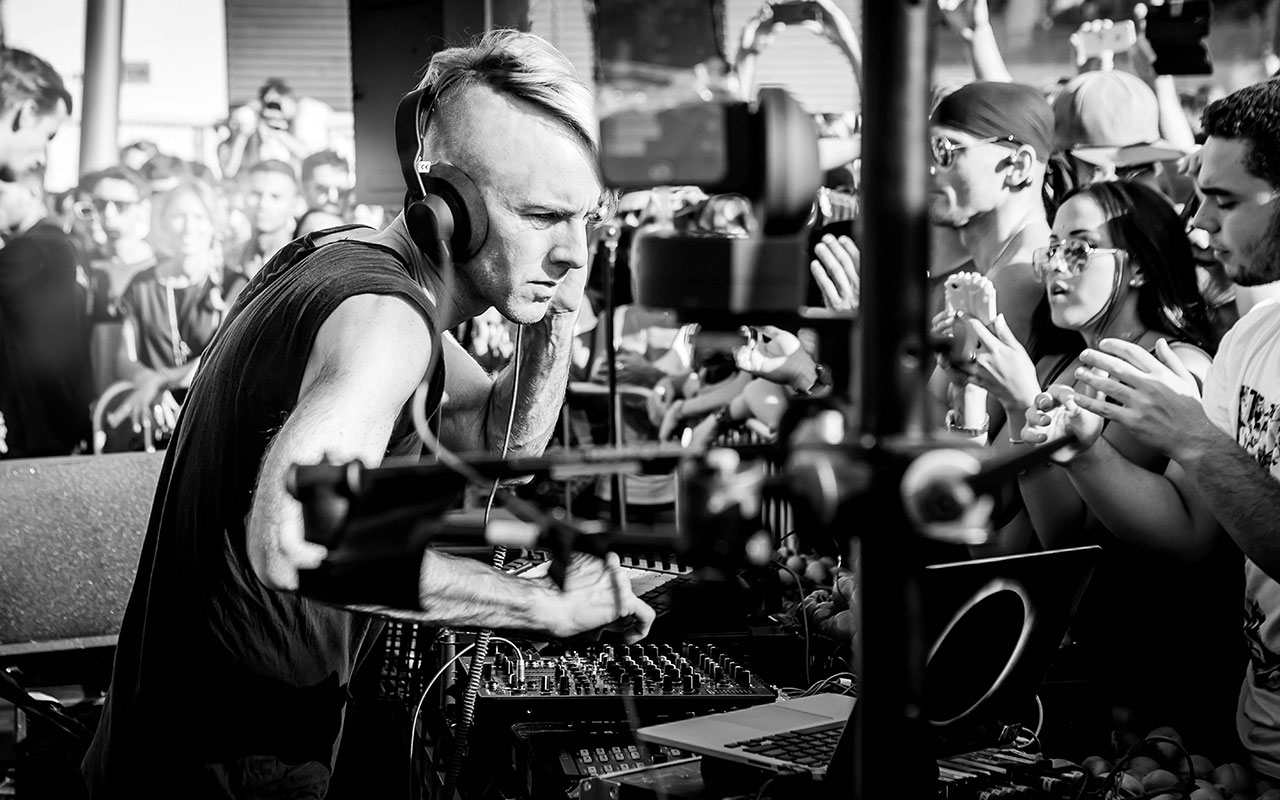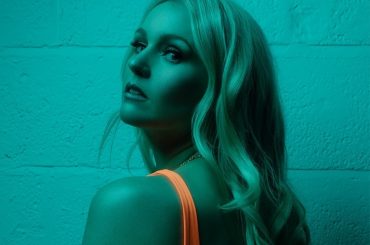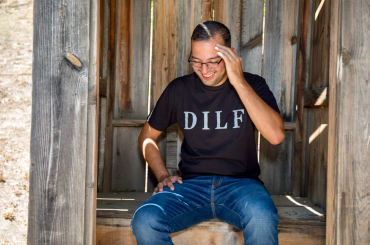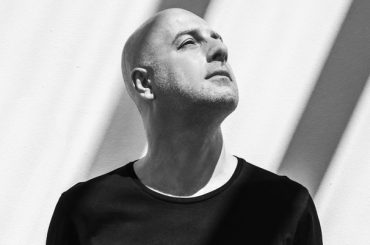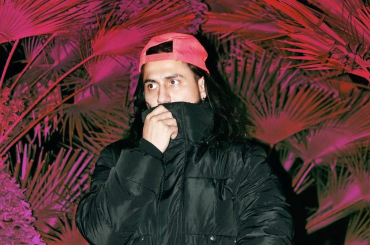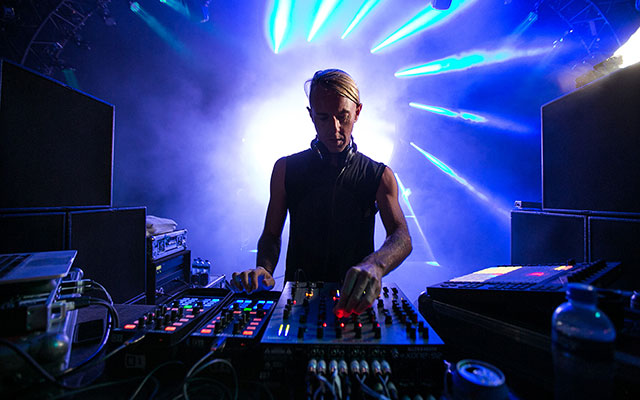
DJ Times: That’s saying something—he’s a great DJ.
Hawtin: He had seen the mixer in the studio before, but this was his first performance with it. He just got on there and was like, “Fuck it, let’s go for it.” He was playing around with the filters and the EQs; there’s a small analog-overdrive circuit and he was messing around with that. There were one or two mistakes, but that’s what a great DJ set is—letting it all come out, live and in front of a crowd. Dubfire, Loco Dice, Chris Liebing, Adam Beyer have all used it. We’ve been testing it out at Berghain and Panorama Bar [in Berlin]; Ricardo Villalobos was just checking it out and was really excited.
DJ Times: Other than the mixer, what is your DJ methodology nowadays? Do you even have a set-in-stone setup?
Hawtin: I do, but it changes from year to year. I’ll make changes in January, February and March, where the schedule isn’t quite as full and when there’s new equipment coming out, and then I’ll lock it down for the rest of the year. At the moment, I have a computer that’s using Traktor with four decks connected to Ableton, with some sends and returns on the mixer so that I can have some reverbs and delays. I’m using the Ableton Push controller, and I’m doing live percussion with that. I have an external guitar foot-pedal flanger. And I have two Allen & Heath Xone:K2 controllers, to control all the computer stuff.
DJ Times: That’s quite a lot.
Hawtin: We have six full stereo channels and two returns on the mixer, and I fill all of that. But it enables me to do what I want to do each night… I hope. [laughs] Aesthetically, it’s about taking prerecorded tracks and ripping them apart, looping them and filtering them and layering them. The idea is that there are fragments of your favorite records, rebuilt in a way that’s like a bass-heavy steamroller.
DJ Times: I’ve heard you play many times, and your sets can indeed be steamrollers.
Hawtin: Yeah, but they’re steamrollers that have progressed over the years. When we were doing the PLAYdifferently Prototypes Tour, I was asking all the DJs what they hope for if they’re on the middle of the dancefloor, with their favorite DJ in control. Many of them said the same thing that I would say: “I want to be surprised.” Everybody can get the same records now; Beatport opened up music for everybody, and I’m happy to have been a part of that—but that makes it so hard to surprise people as a DJ. My personal evolution has been spurred on, in part, by technology, and it’s up to me to use that technology and manipulate things so that they become special again. I’m not trying to take away anything from the tracks that I use. If you want to hear that track, you can have it right on your iPhone. But when I play it, I’m going to play differently. [laughs] Sorry about that—I keep coming back to that term.
DJ Times: Switching gears a bit, last year was the final year of your ENTER. party in Ibiza, right?
Hawtin: I would say it’s in hibernation mode. Last year was the end of phase one.
DJ Times: The Ibiza scene is constantly evolving and regenerating. Do you think that ENTER. played a role in that evolution, or did it stand apart from everything else that’s been happening on the island?
Hawtin: The island is such a small community that I think everybody stands together, really, even if they’re not closely cooperating. I certainly hope we were a part of the development; that’s part of why we started Enter., to bring another angle to what was being offered. Having our ENTER.Mind room, and bringing in people like TM404 and Recondite—people who had never played in Ibiza before—showed that you can have people who aren’t peak-time Amnesia people. I think that was important. But with what I want to do right now—what I want to do with my shows, what I want to do with studio stuff—it just feels like being on the island for 16 weeks in a row is just too much.
DJ Times: Do you think that some people who get into electronic music through, say, the peak-time Amnesia material—or via festival-ready EDM—are slowly finding out about the more underground side of spectrum?
Hawtin: One-hundred percent, yes—especially in America. There’s been a gravitation toward these smaller, cooler warehouse events. You go to them, and you can see that these are the same kids who were getting their minds blown at Electric Daisy Carnival a few years ago. Most of us have gone through that in one way or another. We didn’t just immediately get into Derrick May or Aphex Twin. Well, I didn’t, at least; I was more into Erasure, Nitzer Ebb and Front 242, and that didn’t come ’til after some electro-breakdancing stuff, which was really hip in ’83 and ’84.
DJ Times: How do you find the balance playing huge festivals with DJing at more intimate club gigs?
Hawtin: I’m constantly finding my way with that. Five years ago, we were like, “Let’s play more of these big shows.” If 20,000 or 30,000 people—even more, at something like EDC—are coming together, we’ve got to be there to show people what our sound is, with the hope that some kids are going to get it. And some did. Now we’re trying to take the people we’ve already sucked in one step deeper, to open even more doors for them.
DJ Times: There’s been chatter lately about how the EDM bubble might be bursting. Do you see that from where you stand, from sort of on-the-same-level-but-not-actually part of that world?
Hawtin: Well, the EDM world certainly got big, and we always knew it was an uncontrollable beast. Now, because of its own success, it’s been swallowed more and more by mainstream pop. And mainstream pop kind of constantly veers from one sound to another—it’s a constantly expanding and bursting bubble. The bright side is that we’re in an era where people have become more open to the frequencies that electronic music loves to play with, and that’s great.
DJ Times: You’ve been at this for over a quarter of a century, and you still seem to love what you do—how do you keep your enthusiasm level up after all that time?
Hawtin: Man, I think you just have to live it. There’s no real formula. I started this as a hobby, and I think I found a way to keep it as exciting as a hobby would be. But being around all kinds of aspiring people—young artists and older artists—is the key. I get to meet and hang out with people who I look up to, people like Daniel Miller from the Mute label. And then I get to meet and hang out with an up-and-coming artist who’s just learning. Being inspired and being inspiring… if you can keep both of those things going, you’re both giving and receiving energy, and that’s a positive flow.
DJ Times: People who have been around as long as you tend to acquire a certain amount of haters.…
Hawtin: Oh, I’m quite successful at acquiring haters! [laughs]
DJ Times: Do you pay any attention to them? If so, how do you deal with them?
Hawtin: I do my own Instagram and I do my own Twitter, so I do see it. But I don’t respond to it, either. I can’t say I like it; it can be tough to navigate sometimes. Everyone has a voice, and sometimes that voice—whether it’s good or bad—resonates with you. But I just try to do what I really feel, and if I’m doing that—if I’m living that—it doesn’t matter what anyone says.
DJ Times: Can we be expecting any new music coming our way soon?
Hawtin: I hope so. I would love to have some new music come out every year. It’s been about two years since the Plastikman EX record, and last year we had the Plus 8 anniversary record, From My Mind to Yours—and that one in particular really whetted my appetite. I don’t know that it will always be an album’s worth of music, but I think there will be something. Recondite and I have been working on some songs, and there are some other people that I want to collaborate with as well. I feel like I’m in a creative space right now, and I’m hoping to live in that space for a few years. I want to dive as deeply as I can into a few specific ideas that I have.
DJ Times: What is your favorite part of doing what you do?
Hawtin: Well, it’s the music, of course, and it’s the technology. It’s actually very hard for me to separate them. I was a computer programmer before I fully got into music, so I’m somewhere between being the music guy and the technology guy. But really, it’s the people—meeting people and making friends all around the world. Above everything else, clubbing is social, and that’s the best part about it.


